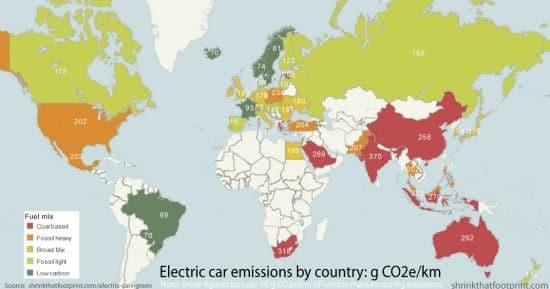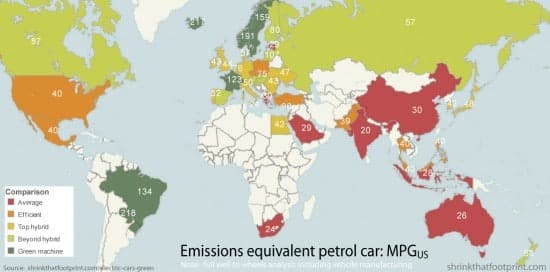Common Remark: Electric Cars Aren’t Green
Are electric cars better for the environment? Actually, they are excellent for the environment as long as the electricity source is “green”. They’re not great when the dominant fuel source for electricity is oil and coal. But what’s behind the people saying “Electric cars aren’t green”?
This is common refrain and serves as a bit of counter-intuitive headline bait. This is how the argument goes: electric cars have higher manufacturing emissions than normal cars. Electric cars use electricity from the grid therefore its footprint is as dirty as its source. Put together these two factors make a ‘dirty little secret‘ that is supposted to negate any climate benefit of electric cars.

Worse, in 2021 a viral Facebook post went around claiming that there’ a French boneyard of electric cars because all their batteries had failed. We cover that here.
Snopes and Politifact fact checkers investigated and found that this was because a company Autolib that let people share electric cars went out of business due to not having a good model.
There were many customers but Autolib couldn’t maintain the cars. In the end the company . We wrote up the story if you’re interested about the French electric car boneyard.
Let’s dissect the line of reasoning that electric cars are dirty.
It’s All About The Juice
Any discussion of whether electric cars are better for the environment comes down to its life cycle emissions. A common feature of articles discussing electric car emissions is the way it’s always very black and white.
In one corner you have the “zero emissions” brigade and in the other the “worse than combustion engine” crew. But as ever, real life comes in shades of grey.
The reality is that even after you account for the bigger manufacturing footprint of an electric car it is all about the fuel mix of the power you use, the ‘juice’ if you will.
Using coal powered electricity electric cars do nothing to cut emissions, using natural gas electricity they’re like a top hybrid and using low carbon power they result in less than half the total emissions of the best combustion vehicle, manufacturing included.
In our recent study ‘Shades of Green: Electric Cars’ Carbon Emissions Around the Globe‘ we calculated grid powered electric car emissions in twenty countries. But we actually had data for quite a few more countries we didn’t include.
Let’s break out the data and put this thing to rest.
Mapping The Electric Car Carbon Footprint
The following map compares the carbon footprint of electric driving using average grid electricity in 40 or so countries. The actual carbon intensity of electricity you use may differ from the national average for a number of reasons, but it’s a great starting point.
The results are shown in terms of grams of equivalent carbon dioxide per vehicle kilometer (g CO2e/km). Each estimate includes emissions from vehicle manufacturing, power station combustion, upstream fuel production and grid losses.
The specs are based on a full electric vehicle, similar to a Nissan Leaf, using the 2009 average fuel mix in each country. Yes this is an older car based on older analysis because the newer cars like Tesla are less carbon intensive.
However, the relative comparisons of the “cleanness” of each countries energy mix still holds. For each country vehicle manufacturing emissions are assumed to be 70g CO2e/km, based on a number of studies detailed in the report.
There is a high variance in the carbon intensity of electricity sources and we have created a short list of countries with the cleanest and dirtiest electricity grid for readers.

Of the 40 countries covered in this map emissions vary from 70g CO2e/km in hydro loving Paraguay, up to a 370g CO2e/km in heavy coal using India. The US average is 202g CO2e/km, in China it’s 258g and in Canada 115g.
Paraguay Is A Paragon Of Low Carbon Intensity Energy
In Paraguay virtually all the emissions are from vehicle manufacturing, as the power is incredibly low carbon. Whereas in India the breakdown is 70g for vehicle manufacturing, 200g from power plants, 30g for fuel production and a whopping 70g for grid losses.
The colors in the legend split the countries into five different groups based on carbon intensity. As you can see, even after vehicle manufacturing is included the carbon intensity of driving an electric car varies 5 fold based on the juice.
For a bit of reference, the average American gasoline vehicle is up at about 300g CO2e/km, while a new hybrid might manage 180g CO2e/km after you include vehicle manufacturing, fuel combustion and fuel production. Even newer hybrids like the Tesla model S are in the 140g CO2e/km range.
Compared To Combustion Vehicles – Are Electric Cars Better For The Environment?
Because grams per kilometer is such a funny metric it is nice to convert these results to something more familiar. Working backwards from the data we can estimate what type of conventional vehicle (if any) would produce similar emissions.
This is the true comparison, an electric car vs an alternative. The alternative is most common a gas-powered car. Depending on your travel patterns, it might also be a bicycle, scooter, train etc.
For want of a better phrase lets call this metric of comparison “Emissions equivalent petrol car”.

Now the figures are much easier to get a grip on.
True, Electric Cars Confer No Carbon Benefit In Coal-Dominated Countries
In coal heavy India, China, Australia and South Africa electric cars using grid power are just like typical gasoline vehicles, in the 25-30 MPGUS range. In the UK, Germany, Japan and Italy they are as good as the best petrol hybrids, in the 45-50 MPGUS range.
But in low carbon supply places like France, Brazil, Switzerland and Norway they are in a different league, averaging well beyond 100 MPGUS for equivalent emissions.
It is important to remember that the electricity you get might not match your national average for any number of reasons. The night time intensity might vary, you might have solar panels or live in a country like the US, where the grid is actually a bunch of separate grids.
For example in Colorado a grid powered electric car is equivalent to about 30 MPGUS, whereas in California it’s up around 70 MPGUS.
For all the comparisons in this map the vehicle manufacturing of a gasoline car is just 40g CO2e/km compared to 70g CO2e/km for the electric vehicle. This is because we have accounted for both a greater manufacturing footprint and lower lifetime mileage in an electric car.
If you are interested in the detail check out the full report. It includes a breakdown of all figures, sensitivities to manufacturing, vehicle performance and comparisons to diesel vehicles.
Electric Cars Are As Green As Their Juice
Critics of electric cars love to talk about manufacturing emissions and putting horses before carts. But they never seem to offer any better solutions. If they were waxing lyrical about urban densification, electrified public transport and the joys of bicycles their critiques would ring true, but that’s not what you hear.
Electric cars are relatively new at a commercial scale and are dealing with issues of cost, range and charging speed. Each of which will be helped by improving batteries. Despite this they offer enormous hope for reducing carbon emissions, improving local air quality and limiting noise pollution.
Conclusion: Yes Electric Cars Are Better For Environment In Terms Of Carbon Intensity Than Gasoline Cars
Electric cars are far from perfect, and there are plenty of valid ways to critique them. But let’s not pretend that a gasoline vehicle can compete with an electric car in terms of carbon emissions. It’s just not a contest.
Give an electric car the right juice and it crushes combustion engines.
Download the report here: Shades of Green
Author’s note: in case you are wondering, I don’t own an electric car. We have an efficient Skoda diesel which is mostly used at weekends with 4 people in it. My preferred mode of transport is my old dutch bike, which in terms of gCO2e/km trashes all comers (foodprint included).
Lindsay Wilson
I founded Shrink That Footprint in November 2012, after a long period of research. For many years I have calculated, studied and worked with carbon footprints, and Shrink That Footprint is that interest come to life.
I have an Economics degree from UCL, have previously worked as an energy efficiency analyst at BNEF and continue to work as a strategy consultant at Maneas. I have consulted to numerous clients in energy and finance, as well as the World Economic Forum.
When I’m not crunching carbon footprints you’ll often find me helping my two year old son tend to the tomatoes, salad and peppers growing in our upcycled greenhouse.

There is no “green” electric cars. Much of the materials in them are mined by hand by poor Africans who are being poisoned every day. The electricity will still be coal/oil/gas unless we build more nuclear plants. Solar, wind, and hydro will never be able to generate enough power to make a difference.
The three main components of a lithium battery are Lithium, Cobalt and Nickel. Anyone who Googles “Cobalt Mine Africa” would never drive an EV ever again.
The current “green” electric vehicle is definitely a myth. Considering the average EV, the vehicle is actual a larger carbon producer than an internal combustion engige vehicle up until about 120,000 miles of running. This factors in ALL of the carbon emmisions that are related to the vehicles production, not just the fuel to drive around after it is sold. Only after that mileage threshold is there any reduction in the total “carbon footprint” from the EV. Also, this whole argument assumes that carbon emmisions must be reduced or we’re all going to die. That is just as much a falacy as most of the green energy movement. Read studies on the uptake of carbon by plants. In a higher carbon environment, plants grow faster and sequester more CO2 than they do in lower CO2 environments. So to say that high CO2 levels in the atmosphere will spell nothing but doom and disaster is ignoring any adaptation that all species on the planet are known to do. While everyone needs to be good stewards of the world we live in, there is no reason to micromanage our society in a way that threatens our freedoms and high level of living in order to appease those who believe we are all going to die from driving our regular IC vehicles.
Cars and their manufacture are “excellent for the environment”. The best argument that you could make for electric cars is that they are less bad for the environment.
Even if we can make a claim that electric cars are better than gas cars, that does not make them good for the environment or “green”. If you break someone’s legs instead of killing them, you are still harming that person
Have you ever seen the process of extracting lithium and the processes after extraction, then the transporting, sorry it’s all a nother money grabbing scam